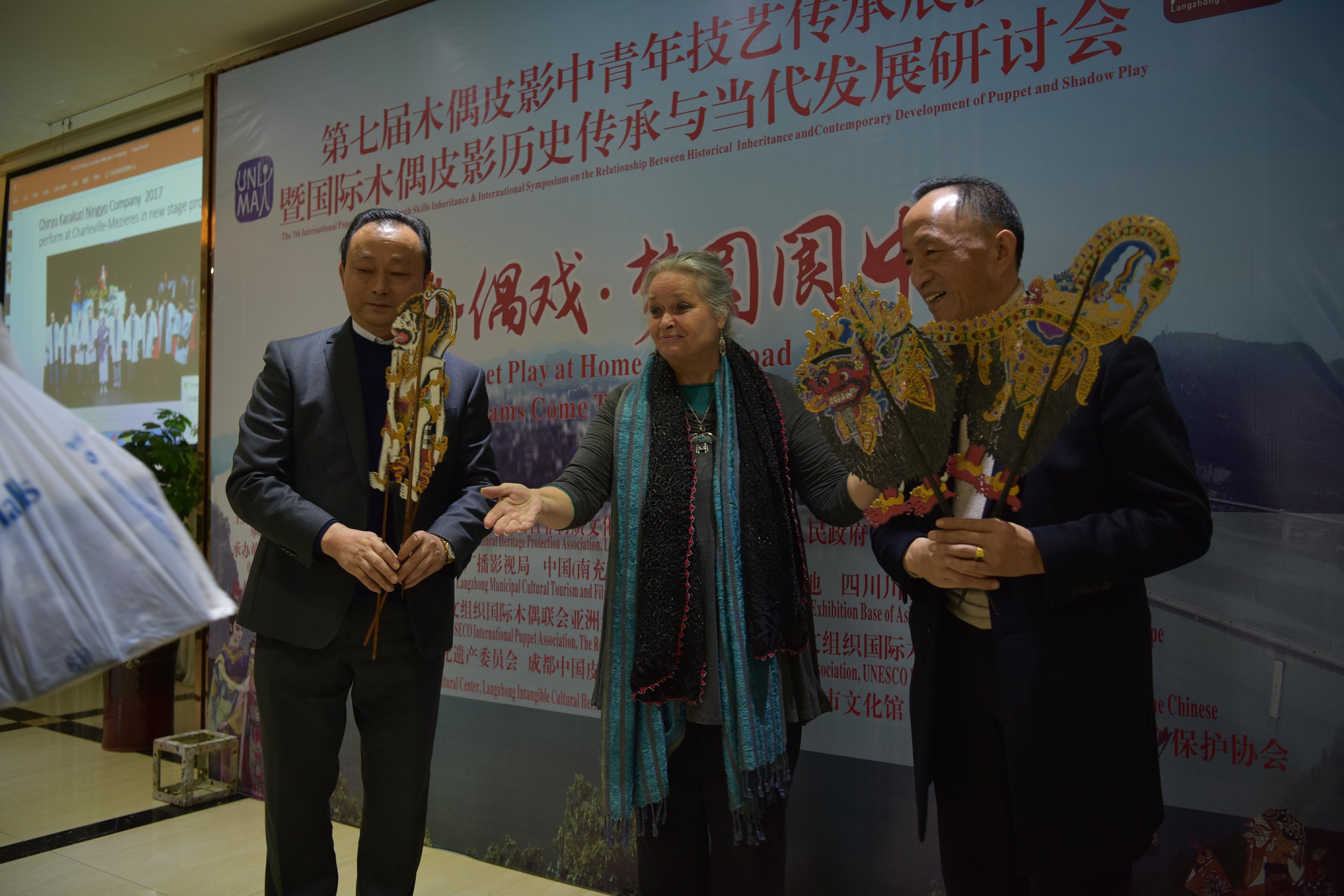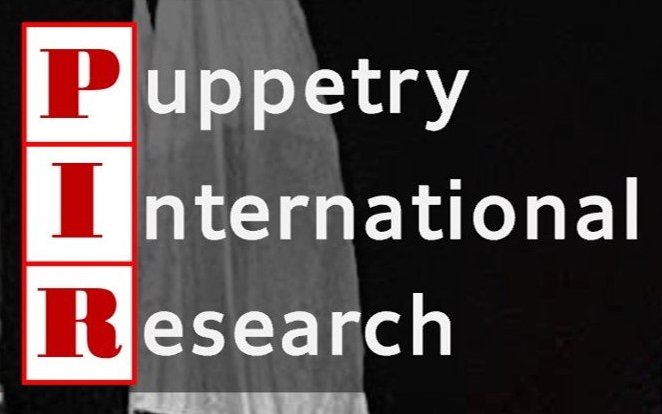Adventures in China Part 2: Langzhong, Sichuan Province, November 18-22, 2018
/Photo courtesy of UNIMA CHINA. (Left to Right): After introducing the 2020 Bali Congress and World Puppetry Festival, Karen Smith presents two Balinese shadow puppets (Hanuman and Barong) to Wang Biao (Director, Sichuan Wang’s Shadow Puppet Troupe) and Wang Fang (Sichuan Wang’s Shadow Puppet Troupe).
UNIMA-USA members, Karen Smith and David Heesen, husband and wife from California, attended two international puppetry festivals and seminar forums held in China this past November. The first event was in Shanghai, the second in Langzhong in Sichuan Province. David and Karen were royally hosted in both cities! And their exposure to Chinese puppetry was quite phenomenal! Karen and David will now share some of the highlights of their 3-plus weeks in that fascinating country.
The 7th National Puppetry and Shadow Art Inheritance Showcase by Young and Mid-Aged Puppeteers
The International Forum on Inheritance & Contemporary Development of Puppetry & Shadow Art
Langzhong, Sichuan Province, November 18-22, 2018
Karen Smith: And now here are some glimpses of the second festival and forum, which was held in the smaller city of Langzhong, November 18-22.
The Langzhong festival and forum were hosted by UNIMA China and The People’s Government of Langzhong, and organized by the Publicity Department of Langzhong, as well as the Culture, Tourism and Press Bureau of Langzhong Government, the national (Nanchong) base of Puppet and Shadow Art, and Sichuan Wang’s Shadow Puppet Troupe, among other government and cultural entities both locally and from the cities of Chengdu and Nanchong in Sichuan Province.
Dave Heesen: Langzhong is a (relatively) little town intent on asserting its prominence in traditional shadow puppetry. To that end, they just sponsored their first international puppet festival, featuring about 28 separate shows by younger Chinese performers. Some of these involved shadow puppets, others rod puppets, string puppets or (my favorites) glove puppets. It’s kind of like the Peking Circus when it arrived in North America in the 1970s. The technical mastery of, say, the acrobats and contortionists or those involved in balancing 12 people on a single bicycle is astounding. Likewise, when it comes to animating these puppets, the Chinese have nailed down and mastered the techniques. No one does it better! Most of Chinese traditional puppetry traces its origins back to the regional operas and classical literature like The Journey to the West or The Romance of the Three Kingdoms. Ideally, the performances are filled with live music – drums, piercing whiny voices, and those fabulous boing, boing, boing gongs and cymbals. (I can’t get enough of these tunes!) Recently, there has been a fair share of official government support for bringing these forms back after the hit they took during the Cultural Revolution. Karen’s job was to open the festival and grace it in her capacity as vice president of UNIMA, the international guild of puppetry. She also opened and attended a seminar where about 20 participants from offshore and from China presented papers on various aspects of puppetry. (Karen prepared a couple short spiels on Indonesian, Indian and American puppetry which I can step up and present when pressed to do so.) And then, of course, we had to begin eating again. Big time.
Karen Smith: I think David has given you a flavor of the Chinese “Showcase” segment. It was wonderful!
While there was a small international component to this second festival held in Yangzhong in Sichuan Province – five companies, from Australia, Indonesia, the Netherlands, Portugal, and South Korea, performed – this festival was essentially a juried showcase of Chinese puppetry, where excerpts from the classical and traditional repertoires and the occasional “modern” piece were performed by young and middle-aged Chinese puppeteers. Great stuff! As several groups of younger puppeteers performed the same excerpts from the traditional repertoire, you really got to be able to distinguish between the so-so or competent and the gifted performers. For the interested audience member, this was like an intensive class in Chinese puppetry techniques and stock repertoire. Fabulous!
David and I thought one of the special aspects of the festival segment was the part played by co-organizers, the two brothers Wang Biao and Wang Fang, fifth generation Sichuan-style shadow masters and joint leaders of their family company (their sons and grandchildren also perform shadow puppetry) – the Sichuan Wang’s Shadow Puppet Troupe. The brothers had convinced the city of Langzhong into donating to their troupe a large traditional-style building situated in the old part of the city, which the Wang brothers have renovated, turning it into a theatre complex with stage auditorium, meeting rooms and provision for a puppetry and shadow theatre museum. The multi-storied complex itself is quite extraordinary, with extensive carving and courtyards within courtyards.
Over two days, around 20 speakers presented at the Langzhong forum, among them UNIMA members Lucile Bodson (France; Treasurer, UNIMA) Tito Lorefice (Argentina; President, UNIMA Professional Training Commission), Cariad Astles (UK; President, UNIMA Research Commission), Samodra Sriwidjaja (President, UNIMA Indonesia), Maria José Machado Santos (President, UNIMA Portugal), Yasuko Senda (UNIMA Japan-Nihon UNIMA), Frans Hakkemars and Joanne Oussoren (UNIMA Netherlands), Bae Geunyoung, Kim Jinyeong and Lee Soojung (UNIMA Korea), Carol Sterling (UNIMA-USA), David Heesen (UNIMA-USA), and several eminent Chinese scholars and bureaucrats.
David presented a slideshow on traditional and modern Indian puppetry, with a focus in the latter half on four Delhi-based puppeteers – Meher Contractor (co-founder of UNIMA India), Dadi Pudumjee (President of UNIMA International), Ranjana Pandey (President of UNIMA India), and Puran Bhat (kathputli master).
Once again, in my capacity as UNIMA International’s vice president, I participated in the Opening and Closing Ceremonies, gave an introductory speech at the forum, talked about the 2020 Bali Congress and Festival, and handed out prizes to the recipients at the award ceremony.
Photo courtesy OF UNIMA China. Outside Sichuan Wang’s Shadow Puppet Troupe theatre and museum complex in Langzhong. Back row, L to R: Manuel Dias (puppeteer, Portugal), David Heesen (UNIMA-USA), Tito Lorefice (Argentina, President, UNIMA Professional Training Commission), Joanne Oussoren (UNIMA Netherlands), Frans Hakkemars (UNIMA Netherlands), Chinese gentleman (?)
Upper Middle row, L to R: Nuno do Ó (musician, Portugal), Carol Sterling (UNIMA-USA), Maria José Machado Santos (President, UNIMA Portugal), Chinese gentleman (?), Cariad Astles (British UNIMA, President, UNIMA Research Commission), Julia Davis (UNIMA Australia)
Lower Middle row, L to R: Chinese gentleman (?), Louise Lapointe (Canada, AQM, President, UNIMA International Festivals Commission), Richard Hart (President, UNIMA Australia), Wang Biao (Director, Sichuan Wang’s Shadow Puppet Troupe), Karen Smith (UNIMA-USA, Vice President, UNIMA), Tó Zé Bexiga (musician, Portugal), Jinyoung Kim (UNIMA Korea)
Front row, L to R: Wang Fang (Sichuan Wang’s Shadow Puppet Troupe), Samodra Sriwidjaja (President, UNIMA Indonesia), Yasuko Senda (UNIMA Japan-Nihon UNIMA), Lucile Bodson (Treasurer, UNIMA), Yulita Samodra (UNIMA Indonesia).





